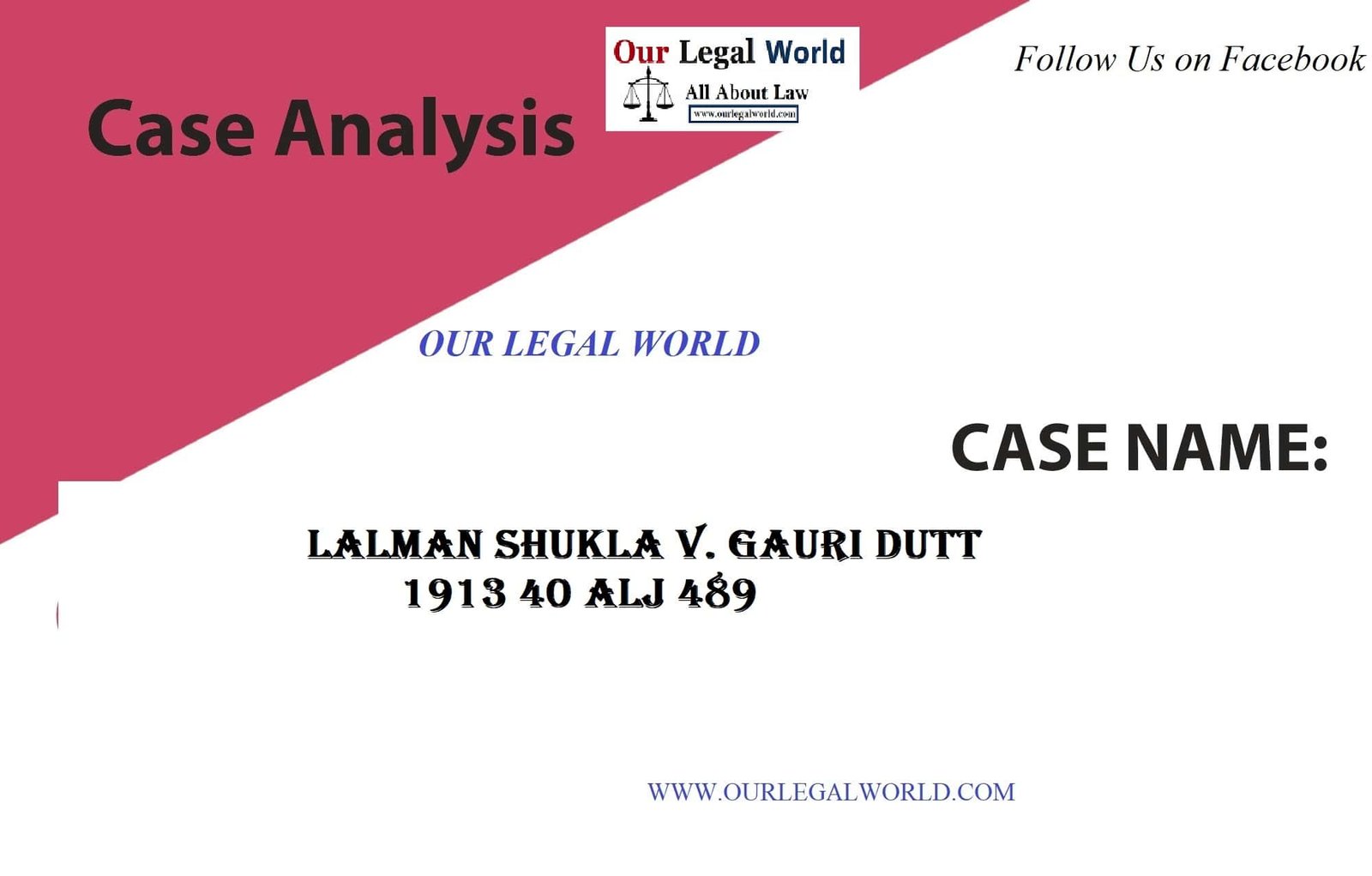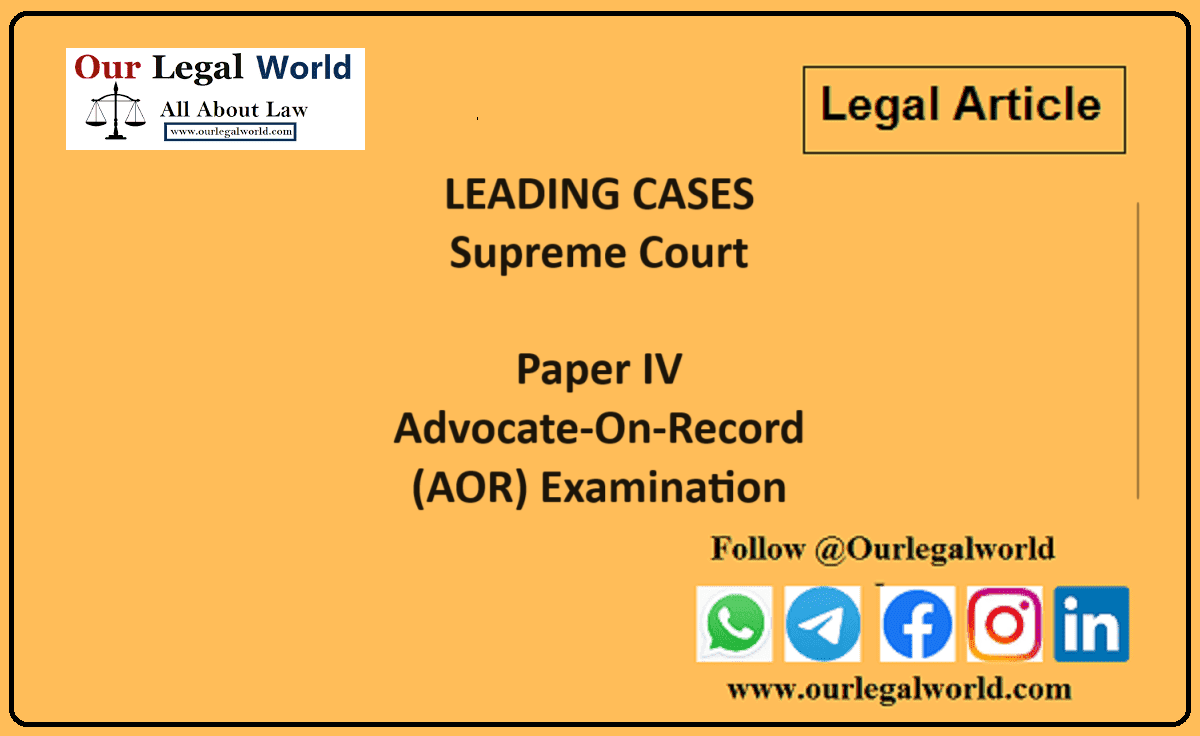Lalman Shukla v. Gauri Dutt:- Case Analysis- Our Legal World
Lalman Shukla v. Gauri Dutt
In the Allahabad High Court Case No. Civil Revision No. 10 of 1913 Equivalent Citation: 1913 40 ALJ 489 Appellants Lalman Shukla Respondent Gauri Datt Decided on 17th April, 1913 Bench Justice Banerji
Introduction
The case related to the validity of the contract in respect to Section 8 of the Indian Contract Act.
The case was between Lalman Shukla, the plaintiff and Gauri Dutt, the defendant. Hereby, the bench consisted of Justice Banerji.
Facts
The landmark case of general offer consists of the following facts as discussed-
Background
The nephew of the defendant, Gauri Dutt was absconded from his wife. Thus, Gauri Dutt sent his servants to find his nephew. All the servants were sent and were given travelling and other expenses. The plaintiff, Lalman Shukla who was also a servant was also sent to Haridwar.
Since for a long time the nephew was not found therefore, the defendant subsequently advertised a reward of Rs. 501 to anyone who will find his nephew.
Reward to Servant
Meanwhile, the plaintiff found the boy in Rishikesh and brought him back to Cawnpore. The defendant awarded the servant with two sovereigns in Haridwar and Rs. 20 when he came back home.
The servant continued his service and did not demand for any further payment.
Later, after six months the servant was dismissed from his service. The plaintiff, then claimed the award i.e. Rs. 499 were due to him in respect of public advertisement for his nephew by the defendant.
Issues Raised
The plaintiffs’ plea in the lower court was rejected. He then, filed a sue in the Allahabad High Court. The issues discussed in the case were as follows-
- Whether the current situation amounts to contract?
- Whether the claim of Rs. 499 be provided or not?
- Whether the decision by the lower court was appropriate or not?
Related Cases
The plaintiff argued in support to the following cases-
- Williams v. Carwadine[1]
It was held that there exists a valid contract when the offer is accepted on accomplishing the ineluctable conditions entailed by the proposer through his proposal.
- Gibbons v. Proctor[2]
The Hon’ble Divisional Court held that if a person performs certain conditions of an offer, completely unaware about the reward on completion of its requisites, is bound by the reward.
Whereas, the defendant relied upon Fitch v. Snedker[3], Ashley, Law of Contract[4] and Pollock, Principles of Contract[5].
He pleaded that the claim could be made only if the contract was made. While the plaintiff lacked acceptance to the provided offer due to which there is no occurrence of the contract.
Judgement
The Allahabad High Court agreed to the given decision of the lower court. Therefore, it concluded that acceptance is the essence to contract. This means that the contract did not occur and the plaintiff cannot ask the reward as published in the advertisement.
Thus, a contract without acceptance is declared to be void. Hence, there was no valid contract between the parties and the defendant was not liable pay the plaintiff.
Related Provisions
- Section 2(a) of the Indian Contract Act, 1872 defines proposal as follows-
“When one person signifies to another his willingness to do or to abstain from doing anything, with a view to obtaining the assent of that other to such act or abstinence, he is said to make a proposal.”
- Section 2(b) of Indian Contract Act, 1872 defines promise as follows-
“When the person to whom the proposal is made signifies his assent thereto, the proposal is said to be accepted. A proposal, when accepted, becomes a promise.”
- Section 2(h) of Indian Contract Act, 1872 defines contract as follows-
“An agreement enforceable by law is a contract.”
- Section 3 of Indian Contract Act, 1872 states that-
The proposal must be communicated to the person who is expected to accept the offer.[6]
- Section 8 of Indian Contract Ct, 1872 defines-
“Performance of the conditions of a proposal, or the acceptance of any consideration for a reciprocal promise which may be offered with a proposal, is an acceptance of the proposal.”
This means that-
- Offer + Acceptance = Agreement
- Agreement + Enforceable by law = Contract
Ratio Decidendi
Therefore, it is seen that knowledge and acceptance are essence to the formation of valid contract. This means that if a person accepts the given proposal only then, reward can be claimed in return. Also, communication is necessary to achieve the reward which lacked in the current case. Most importantly, it tells that acceptance must be made within a reasonable time and must be communicated to the offeror. Thus, in one way or another it implies that intention to enter in a valid contract is must to perform the legal obligations.
Also Read: VOID AGREEMENT UNDER SECTION 24 to 30 OF INDIAN CONTRACT ACT, 1872
Conclusion
This is a leading case of general offer. Thus, it has played an important role in laying down the principles related to the general offer. In general offer, the contract is made with the person who having the knowledge of the offer comes forward and acts according to the conditions of the offer. An offer of reward made by way of advertisement for finding lost articles is the most appropriate example of a general offer as seen in this case also.
If a reward is offered for completing a certain task, only the person who completes the task can accept the offer. Whereas, in the present case the offeror lacked acceptance and communication and hence, not entitled to the reward in return.







![Tax Law Internship at Legum Attorney [Chamber of Ashish Panday], Delhi : Apply by 15th May 2025](https://www.ourlegalworld.com/wp-content/uploads/2025/05/IMG_0113-min.png)

